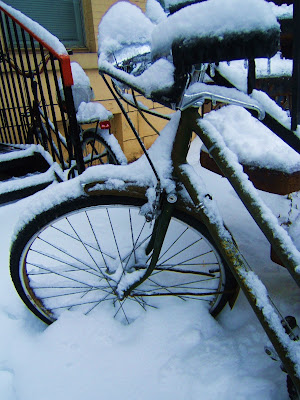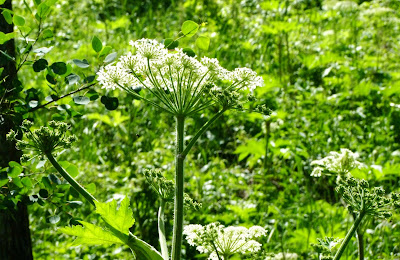







 Photos above taken in Montréal, early December 2008 (right 'round this time last year, to be precise) ... ice storm. Funny how things are unearthed.
Photos above taken in Montréal, early December 2008 (right 'round this time last year, to be precise) ... ice storm. Funny how things are unearthed. au coin d’hutchison & lajoie
you said: we’re in montréal, &
it’s snowing! not côte des neiges,
but mile-end, unlost now
in a neighbourhood of white.
parapets fog-veiled, muffled sky
falling down, a soft shy
rabbit down, translucent
boulangerie window beacon
beckoning on past lajoie & up –
je t’ai dit : quand le ciel est gris,
tes yeux sont plus bleus
& plus lucides – stop at the
épicerie, our pockets full of
clementines, & my hands, they
are full of your hands as the street
pulls us past a sculpture garden
frozen to the tracks, icy bicycle
sarcophagi, then a pigeon whirlwind,
like grey flakes upward flying,
a shivering drunken choreography
in the wind. we follow home
the dark coattails of the hasidim,
flitting winter moths in a haze
of soggy pollen, seeking window light.
* * *
late at night, an ice storm.
chimes of frozen juniper clink
on panes, basement bell choir
lulling us to sleep. outside
the snow falls, turns to rain
just above the tallest trees,
then ices on the ground, encases
the house. you reach out
for me in sleep, twining branches
of a frozen sumac, eyelashes
on my skin like snow brushed
from a railing, breath in my ear.
we change state. somewhere
we sublimated, went solid to air,
fell as snow & gathered here
& i am bursting. how do i
speak of the wild & quiet
beside you, when there is no more
space to be contained. &
hush, hush, do you hear it?
the icicles are singing – ascending,
descending the eaves like
a row of organ pipes, a hundred
roofs wide, making a remedy
for cryptic aching, a mouthful
of snow, the inner melting, trop
de la neige & de l’eau pour
un petit cœur assommé
 I've written about this car before, a long while ago (see
I've written about this car before, a long while ago (see  And so this is a gentler reclamation of my mother's first car. Can't remember why she stopped driving it, I think my cousin drove it after her, finally it rolled to a stop out back on the acreage by the treehouse... and the hood came off, the engine was removed, and three, four, five persistent aspen sprouted up through the rusting cavity.
And so this is a gentler reclamation of my mother's first car. Can't remember why she stopped driving it, I think my cousin drove it after her, finally it rolled to a stop out back on the acreage by the treehouse... and the hood came off, the engine was removed, and three, four, five persistent aspen sprouted up through the rusting cavity. 


















